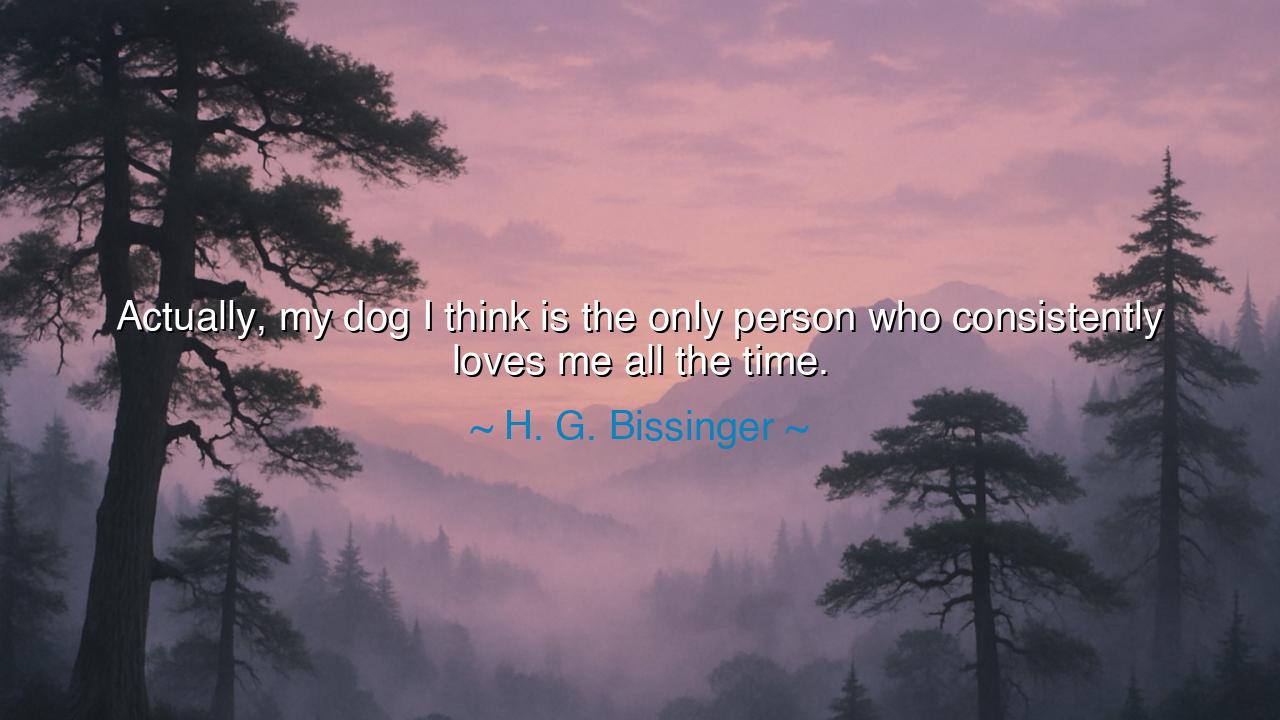
Actually, my dog I think is the only person who consistently






Hear now, O seekers of comfort and wisdom, the words of H. G. Bissinger, who with quiet honesty declared: “Actually, my dog I think is the only person who consistently loves me all the time.” Though spoken with humility, these words carry the weight of eternal truth. For they speak of love, not as it flickers among the changing hearts of men, but as it abides faithfully in the loyalty of a humble creature. The dog, that guardian of hearth and companion of solitude, becomes here the emblem of devotion that does not waver, that does not falter, that does not betray.
In the world of men, love is often conditional. It rises and falls like the tides; it depends upon moods, upon circumstances, upon gains and losses. Yet in the gaze of a dog, there is constancy. The master may fail, may stumble, may grow weary, but the dog remains steadfast. He greets you with joy in triumph, and he comforts you in despair. Such unwavering loyalty is rare among humankind, and so Bissinger’s words reveal a truth that pierces deeply: that sometimes the purest love comes not from people, but from those creatures who ask little and give all.
Consider the tale of Greyfriars Bobby, the dog of Edinburgh, who after his master’s death, kept watch over the grave for fourteen years. Through storm and snow, through hunger and loneliness, the small creature held fast to love. No man commanded it; no reward awaited him. It was devotion pure and unbroken, a lesson to all who beheld him. Such is the consistency of an animal’s affection: it does not reckon gain, it does not measure worthiness, it simply abides.
History offers us also the story of Alexander the Great and his faithful dog, Peritas. In battle, when Alexander was surrounded and near death, Peritas leapt into the fray, shielding his master and driving back attackers, though he was mortally wounded. Here was not a mere beast, but a friend who gave his life without hesitation. Would every human friend do the same? Perhaps not. Yet in the heart of a dog, loyalty is as natural as breath.
Bissinger’s lament also reveals something about the human soul: that it longs for a love without condition, a love that never withdraws. Too often, people find betrayal where they sought loyalty, or indifference where they sought care. Thus, the faithful affection of a dog becomes a balm for the weary heart. It reminds us that unconditional love is possible, and it awakens within us the yearning to both receive and give such constancy.
The lesson for us is profound: we must not take for granted the steadfast affection of those around us, whether they walk on two legs or four. We must learn from the dog’s heart—to love not only when it is easy, not only when it benefits us, but always, and without ceasing. If a creature without words can show such consistency, how much more should we, who carry reason and spirit, strive to love one another faithfully?
Practically, this means we must train our hearts in the ways of loyalty and devotion. Be present for those you cherish not only in their triumphs, but in their defeats. Love them not for what they give you, but for who they are. Be constant, not fickle; forgiving, not harsh. And in your own solitude, cherish the faithful companions—whether friends, family, or dogs—who walk with you through every season.
So, O children of tomorrow, remember this truth: that unconditional love is rare, but not impossible. Learn from the loyalty of the dog, and let it shape your own heart. For the greatest monument you can leave behind is not wealth nor power, but the testimony that you loved faithfully, that you loved consistently, that you loved all the time. In this way, the wisdom of Bissinger will not be lost, but will be fulfilled in your life and in the lives you touch.
––






AAdministratorAdministrator
Welcome, honored guests. Please leave a comment, we will respond soon